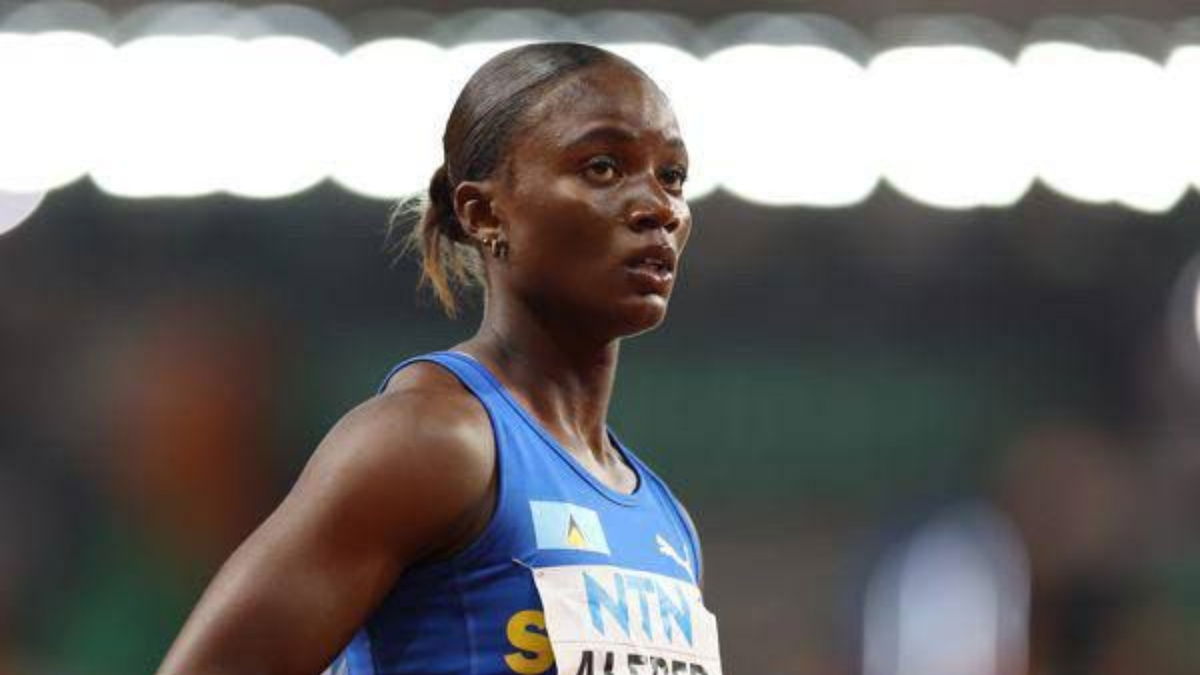
Imago

Imago
“Even though it hurts a lot, I trust him and what he has for me,” is how Julien Alfred summed up the strenuous, brutal training she’s had to endure this season. Primarily a 60m, 100m, and 200m superstar, the 23-year-old thought she’d seen everything her sport had to offer. Well, enter Edrick Floreal—the Canadian retired long and triple jumper-turned-Texas Longhorns track coach—and it seemed like the Olympian’s days for resting ceased to exist. Just one of the five events the athlete participated this year till now has been a 200m. The rest? Disciplines that many might think will stretch her too thin.
Watch What’s Trending Now!
The young phenom started her year on February 2 with the 300 Metres Short Track event at New Balance Indoor Grand Prix, Boston, finishing with a blazing 36.16 seconds and setting a new national record. Then she moved to the 400 Metres Short Track at Clemson Tiger Paw Invitational on February 14 setting another national record with a 52.97-second run. What’s more? On March 29, Alfred won the women’s 4X400 relay with a time of 3:25:03, and doubled down with a grander achievement: Beating five-time Olympic gold medalist Shericka Jackson in 300m at the 2025 Miramar Invitational with a 36.05s over the Jamaican’s 36.24s run. While these results look good on paper, it’s bound to strain Alfred’s body, right?
Well, apparently, that’s exactly what Floreal is looking for. While making a sprinter run longer distances might be a tad bit cruel, American sprinting legend Justin Gatlin seems to disagree. Defending Floreal’s methods, Gatlin explained how this calculated chaos is actually a long game. Speaking on the Ready Set Go podcast aired April 23, the retired sprinter highlighted the genius behind the St. Lucian’s training strategy, and how calculated and beneficial it is. “I love what Coach Flo is putting together for her,” Gatlin mentioned before adding:
ADVERTISEMENT
“[She’s] working up volume and…coming down and using the professional ranks. You do a lot of volume and you shroud it in secret. You do it in practice, right? And then you start coming down and then you go into your respectable discipline…of a 200 or 100. But, watching someone like Julien Alfred and Dina-Asher Smith run 400s, run 300s, run 4x4s…Not just one or two [times] a season, but…multiple times within that same season, you can see the progression, you can see the strength and you see the speed start to come into effect.”
“I think it’s genius of what [Florean] is doing…For short sprinters, it’s almost like a nightmare because you’re like, ‘Yo, I am a 100-meter runner. Why am I running these 400s and 300s out in public? In front of everybody?” In simple words, the pain and difficulty of these longer events are stepping stones to unlocking even more speed in primary races. Julien herself, while initially not thrilled with the shift, has embraced it fully. Moreover, if she excels at running longer distances, the newfound endurance will propel her to further glory on home turf-short sprints, too!
“The strength that he puts on both of them, you could see that it’s going to pay off later in this season, especially with Dina-Asher Smith running 52 and Julien running…21 in the 200,” he concluded. Well, the dominance era has already started. Alfred’s results this year already speak volumes about the effectiveness of Floreal’s plan. Julien’s strength-building phase has transformed her into a formidable force on the track…
ADVERTISEMENT

ADVERTISEMENT
Seems like her coach has heralded a new era in the sprinting community. Let’s dive in more…
Top Stories
Scottie Scheffler Faces Scrutiny After Taking Out Anger on Golf Club at WM Phoenix Open: ‘Washed’

Jordan Spieth Throws Bizarre Temper Tantrum as Opening Round at WM Phoenix Open Becomes a Challenge

Rob Gronkowski Demands Severe Punishment for Andy Reid After Bill Belichick Snub

PGA Tour Split Into Two as Scottie Scheffler Confirms Stance on Patrick Reed’s Return

Drake Maye Reveals Shoulder Injury Update as Patriots QB Announces News On Super Bowl Availability

Rickie Fowler Fans Demand Answers Following ESPN’s Controversial WM Phoenix Open Decision

ADVERTISEMENT
The strategy that’s changing the sprinting game
Coach Flo and Julien Alfred? That’s a duo focused on success. From the moment Edrick Floreal spotted her spark, he was locked in on a mission to mold the Saint Lucian into one of the sport’s elites. And when that dream finally hit gold at Stade de France, Julien made sure the world knew where her heart was. “I have to give thanks to my coach. I think he is my spine and my rock. He has been with me through the highs and the lows. After Worlds last year, I cried on his shoulder so much, and I just want to thank him for this, having my back throughout and the times where I felt like giving up on myself.” That emotional fourth-place finish in Budapest may have broken her heart, but it also lit a fire.
Julien used the disappointment as fuel, came back stronger, and delivered a jaw-dropping upset in Paris, beating the heavily favored Sha’Carri Richardson in the 100m final. But even in that shining moment, it wasn’t just about revenge or redemption. It was about gratitude. “I really wanted it for myself and am also so happy to have such an amazing group around me, most importantly, my coach is everything to me, and I would not be here without him.”
Her words hit like a victory lap. A tribute to the team behind the triumph and the grind that brought her there.
ADVERTISEMENT
ADVERTISEMENT
ADVERTISEMENT
ADVERTISEMENT